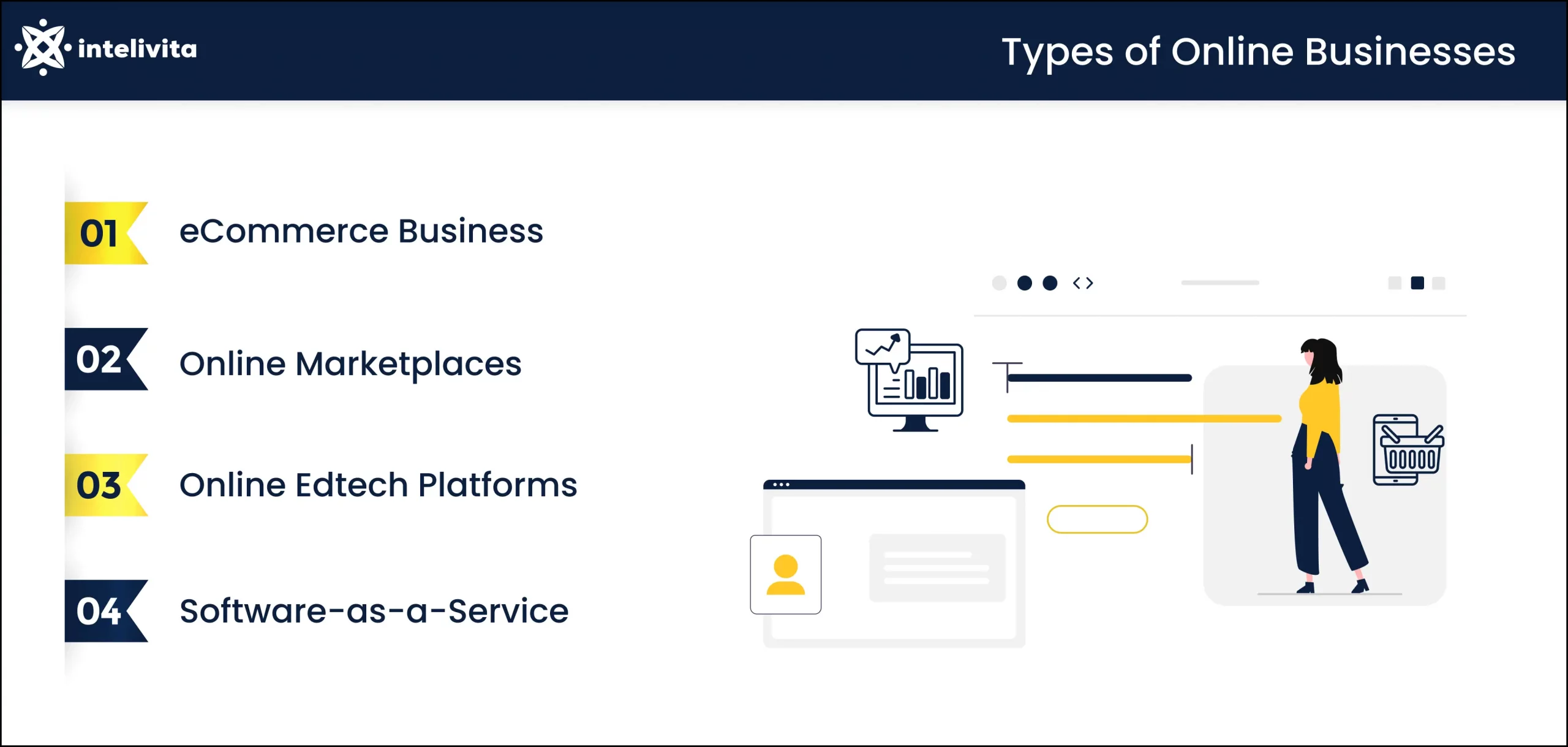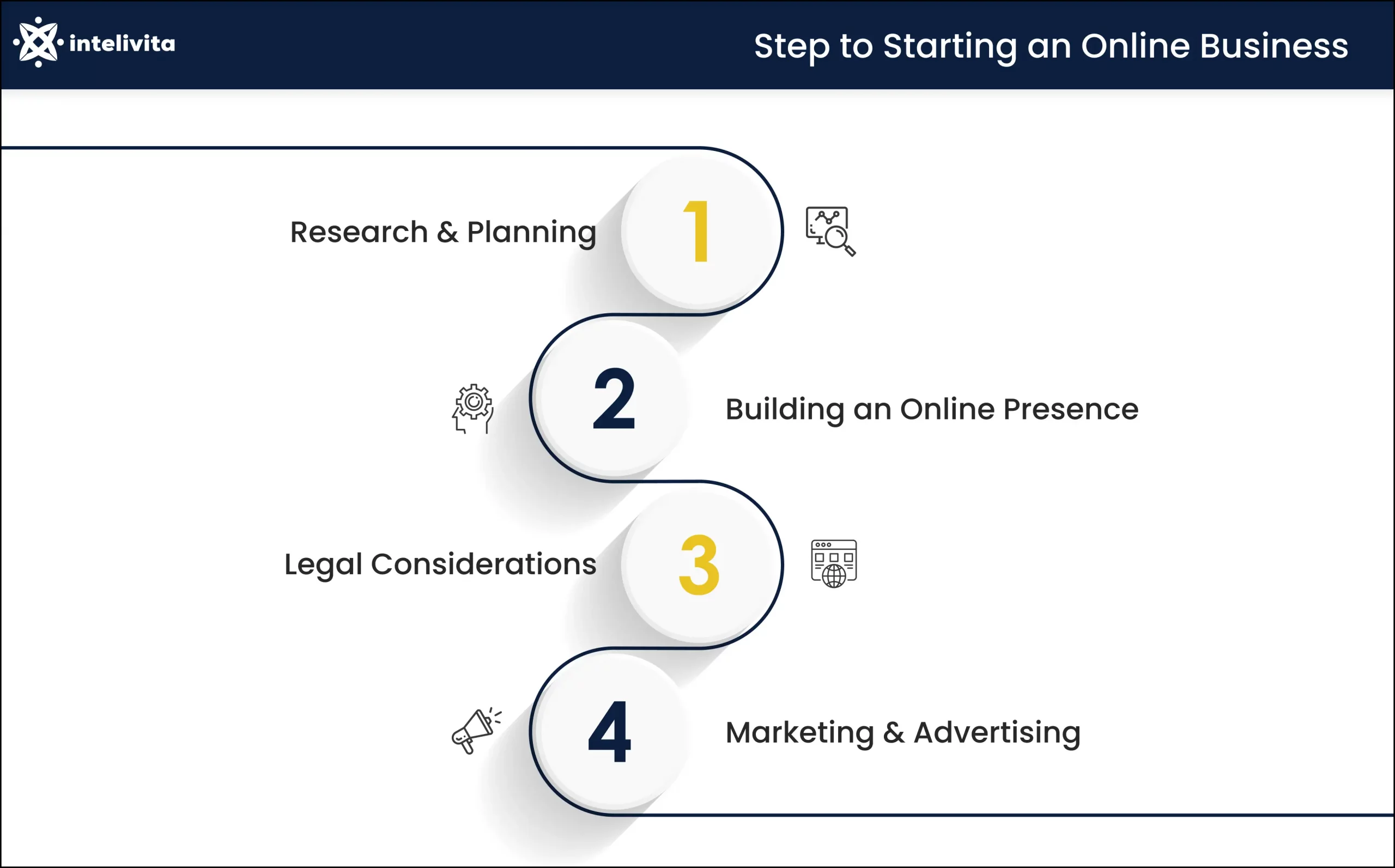Knowing how to start an online business can be key to attaining noteworthy success as an entrepreneur.
According to NASDAQ, 94% of B2C purchases will be via the internet by 2040.
This points to a potentially profitable sector to key into for mouthwatering profit.
Are you an entrepreneur, startup founder, or business executive looking to start an online business?
If yes, then read this article to the end as it contains everything to know about launching a web business.
In this article, we’ll touch specifically on the following:
- Definition of an online business
- Types of online business
- Statistics on online business
- Steps to launching an enterprise online
- Process of scaling your internet solution
- And more!
Let’s discuss the intricacy of the article. Enjoy!
What is an Online Business?
An online business, also known as an e-business is a commercial enterprise that operates over the internet.
This type of business takes varying forms, from selling services or products online to digital content or providing information.
Online businesses often leverage the internet to reach a large pool of audiences, communicate with customers, and conduct transactions.
They use a range of online marketing strategies, such as search engine optimization, email marketing, and social media marketing to promote their products and services.
Ready to turn your online business idea into reality? Dive into our Ultimate Guide and let’s launch your dream together! Schedule a FREE call with our eCommerce Consultants to kickstart your journey!
For a better understanding, let’s elucidate the types of online businesses.
Types of Online Businesses
| Online Business Type | Description |
| eCommerce business | An e-commerce business is one whereby you conduct transactions, sell products, and provide services via the internet. It entails buying and selling goods and services via online platforms, such as websites and mobile apps.
For more information, read this article on e-commerce app development costs. It educates you better on the business model and the cost of starting one. |
| Online marketplaces | An online marketplace is a digital platform where many sellers and buyers can register on a site, and conduct business transactions. Payment here can be on or off the website.
Basically, it’s a virtual marketplace where transactions can take place. An example is Gumtree. |
| Online edtech platforms | An online ed-tech platform is an educational website or mobile app where users can learn. Common examples are Udemy, Coursera, etc. |
| Software-as-a-Service | Software-as-a-service (SaaS) is a cloud-based software delivery model where service providers host applications and deliver them to customers via the internet.
Rather than downloading the software on their local computers, users can access them through a web browser. In the SaaS business, the provider creates, hosts, and maintains the website. While the users simply access it either free or via subscription on mobile or desktop devices. SaaS applications are common in customer relationship management, human resources software, project management, accounting, etc. Seems interesting? Read more about SaaS app development here. |
Now that you know the types of online businesses out there, why should you own one?
There are numerous statistics out there suggesting that starting an online business leads to immense profit and growth. We’ll discuss some.
📊 Statistics Suggesting Why you Should Start an Online Business
To help you understand the profitability of the online business and its prospects, we’ll consider some statistics:
- 15% of Americans shop online on a weekly basis.
- 79% of businesses with a website expect to grow by 25% in the next three to five years.
- 18% of online local business searches convert to sales within a day
- 29.7% of businesses in the United States are done online.
- 85.9% of millennials make purchases online.
- 34% of those who shopped online before prefer it to a physical store.
What’s more? Let’s discuss how to start an online business:
Steps to Starting an Online Business
There are multiple phases to starting an online business, there entail:
Let’s take a dig into the steps here, and all the aspects of each step.
Step 1: Research and Planning
The research and planning phase of launching an online business entails gathering information and making strategic decisions that can impact the growth of your idea.
Consider it the foundation, as every effort taken to ensure the success of your business rests on this step.
Here are some of the numerous aspects of research and planning:
| Aspect | Description |
| Find the right business idea | Finding the right business idea is at the crux of having a successful online enterprise.
To find a great idea:
|
| Market analysis | According to CB Insights, 35% of businesses fail due to no or low market need.
A market analysis studies the dynamics and attractiveness of a special market within a special industry. Market analysis is the process of examining and evaluating the conditions and dynamics of the market. This analysis aims to find market potentials, loopholes for your idea to key into, and the response of the market to your idea. The data gathered during market analysis is then used to form decisions about marketing campaigns, pricing, and product development. |
| Competitor analysis | Competitor analysis entails the process of evaluating the strengths and weaknesses of your business vis-a-vis in comparison to your competitors.
Here, your business analyst will gather and analyze data about competitors including their marketing strategies, pricing, target markets, and market share. This process helps to gain a better understanding of the competitive landscape and identify potential opportunities and threats. Market analyses are used to inform decision-making in relation to marketing, product development, and overall business strategy. |
| Set milestones | Setting milestones is an important step in research and planning.
Milestones are specific, measurable goals that aid to track progress and remain focused on tasks you need to accomplish. Some reasons to set milestones when starting your online business entail:
When setting milestones, try to be specific and realistic. Here are some examples of milestones that can be specific to your online business:
|
Once the research and planning phase is completed, the next step is legal considerations.
Let us delve into that:
Step 2: Legal Considerations
These are the legal and regulatory requirements that businesses have to consider when launching, operating, or scaling their enterprise.
Legal consideration entails compliance with federal, state, and local laws, regulations, and requirements.
Some businesses require certifications, licenses, and permits.
There are many aspects of legal considerations to consider before starting an online business.
And they include the following:
| Aspect | Description |
| Business structure | This is the legal or organizational structure of your online business. It is the way your enterprise is set up to conduct its operational procedures.
Common business structure entails:
|
| Business registration | This is the process of officially registering a business with the government, usually at the state or local level.
Business registration typically involves filing the necessary forms and paying any required fees to establish the legal existence of the business. The registration process may vary depending on the type of business and the state or local jurisdiction in which it is located. In general, the registration process may include:
Business registration provides legal protections, such as liability protection for the owners and the ability to sue and be sued in court. |
| Obtain necessary permits and licenses | The permits and licenses you need to start an online business idea depend on the type of business and location where it’s based.
Common permits and licenses are:
|
Failing to comply with legal considerations can result in consequences, such as fines, penalties, lawsuits, or even business closure.
Therefore, it is important for businesses to consult with legal and regulatory experts to ensure they are meeting all legal requirements and obligations.
Once you’ve ticked all boxes in terms of legal considerations, the next step is to build an online presence.
Let’s discuss this:
Step 3: Building an Online Presence
This step entails the processes surrounding creating a website or mobile app where your users can find your product or services.
This step is a pretty technical one, as you’ll need a team of developers.
And where you’re creating a complex solution, you’ll need UI/UX designers, Programmers, QA testers, Business analysts, Project managers, etc.
The number of professionals, and the seniority you’ll need depends on the intricacy of your web or mobile app.
The aspects here are:
| Aspect | Description |
| UI/UX design | This process entails creating wireframes, mockups, and prototypes depicting the overall look and feel of the online platform before the developer starts coding.
The UI/UX designer identifies the features of the platform and gathers information through a project manager on the requirements of the platform. This stage sets the foundation for the overall web or mobile app development process. As such, it’s highly crucial to have a desirable product. For more information on this important step, read this article on UI/UX design cost. |
| Platform Development and testing | This phase entails writing the necessary codes required to develop the live app.
This process is intricate to starting an online business as it creates the platform of interaction between your target audience and your business. The development step is split into the backend (server-side framework development), and frontend (client side). For more information, read this article on web development costs. |
| Launch the website | Once the platform is ready, the next step is to launch it.
For a website, you need a hosting platform and a domain name. |
At the end of this step, you should have a live app or website for reaching your target audience.
Let’s delve into the next step, which is marketing and advertising.
Step 4: Marketing and Advertising
Marketing is the promotion of products or services using channels such as email, search engines, social media, etc.
Advertising, on the other hand, involves paid promotion of services or products using digital channels.
However, before digging into the marketing processes, it’s best to first have a marketing plan.
A marketing plan is a detailed document outlining the overall marketing strategy and tactics for achieving a business’s goals.
Consider it as a roadmap that guides your marketing efforts, and ensures that marketing plans are in-tune with business objectives.
Let’s dig into the different aspects of marketing to consider:
| Aspect | Description |
| Content marketing | 91% of marketing professionals surveyed by SEMrush achieved success with their content marketing.
This is a marketing strategy that entails creating and sharing valuable and relevant content to attract a target audience. One of the aims here is to build trust and credibility with your target audience, establish yourself as a thought leader, and drive profitable customer action. |
| SEO | 68% of online experiences begin with a search engine. As such, you have to monetize your platform for that.
Search engine optimization (SEO) is the process of improving the visibility and ranking of a website or web page in search engine results pages (SERPs). The goal of SEO is to increase the quantity and quality of organic traffic to a website from search engines such as Google, Bing, or Yahoo. Some common SEO tactics to try out are:
|
| Social media advertisement | Social media advertising is a type of online ad placement that leverages social platforms to reach a target audience.
Social media platforms like Instagram, Reddit, Facebook, LinkedIn, and Pinterest offer multiple advertising options. They include:
They allow users to target audiences based on demographics, interests, behaviors, and criteria. This allows highly targeted ads to reach specific audiences. Social media advertising can be a powerful tool for businesses of all sizes to increase brand awareness, drive website traffic, generate leads, and boost sales. By utilizing the targeting and analytics tools provided by social media platforms, businesses can create highly effective and efficient advertising campaigns. |
| Email marketing | Email marketing is a strategy that involves sending promotional newsletters and messages to a target list of subscribers via email.
Email marketing helps to build relationships with customers, drive conversion, and promote brand awareness. Email marketing takes multiple forms, that include:
To be successful in email marketing, businesses must create compelling content, personalize their messages, and ensure that their emails are mobile-friendly and comply with anti-spam regulations. |
By adopting all the strategies above, you’re undoubtedly going to have a robust online business.
However, when demand surges, what’s next?
It’s time to scale. Let’s discuss how to scale your online business:
How to Scale an Online Business
Scaling an online business involves growing your business to improve sales, production capacity, and overall operations to deliver to an increasingly large audience.
Let’s discuss some tips for scaling your online business:
#1. Hire New Employees
This is pretty straightforward.
Once the demand for your product increases, you should hire extra hands to cater to the new orders.
Perform a stress test to see what areas of your production/service delivery line are overworked, then hire new employees in that direction.
#2. Expand your Product Line
Expanding a production line means increasing your capacity to produce more goods or services to meet surging demands.
It can also entail introducing a new range of products.
Basically, you’re increasing your output here.
The expansion involves several steps:
- Analyzing product data
- Identifying bottlenecks
- Optimizing workflow.
#3. Invest in Technology
This is one of the most important aspects of scaling an online business.
Why?
Online platforms have the bandwidth.
Consider bandwidth as the level of traffic that can enter a website at once without crashing.
As such, you need to increase your website’s bandwidth to be able to handle surging traffic.
Also, you might need to revamp your codebase to make it fast, and secure, and prevent downtime.
If you’ve made up your mind to start an online business, then it’s imperative to hire a top-of-the-class web or mobile app development company.
Let Intelivita Provide the Most Ideal Platform
Now that you know how to start an online business, let’s help you get started.
A crucial part of having a successful e-commerce company involves partnering with an innovative software development service provider.
At Intelivita, we have a decade of experience creating online websites and mobile apps for SMBs, Startups, and Unicorns.
You can learn more about our full-service online business development service by contacting us.






![How to Build Great eCommerce Customer Experience [4 Ways]](https://www.intelivita.com/wp-content/uploads/2024/04/How-to-Build-Great-eCommerce-Customer-Experience-4-Ways.webp)